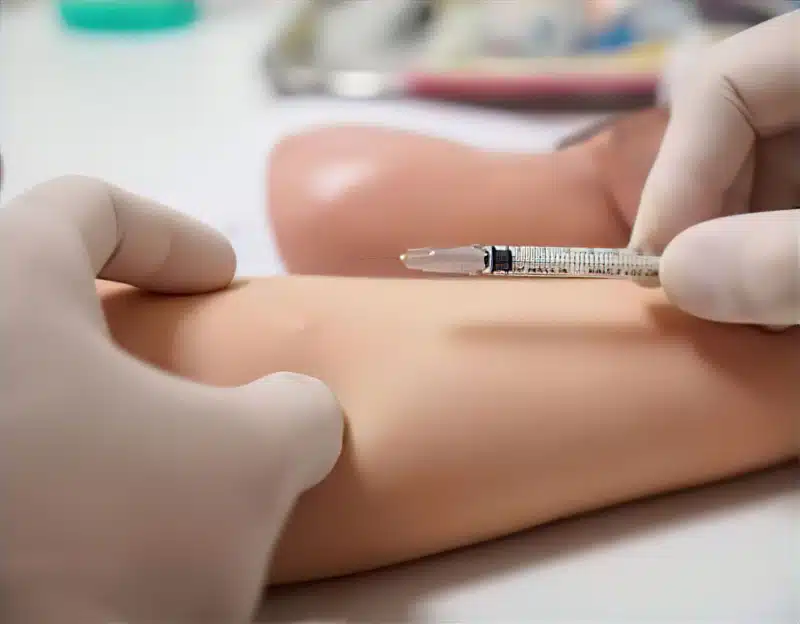
What is an intradermal allergy test?
A tiny amount of the allergen is injected beneath the skin during an intradermal allergy test. In the event that a scratch test is unclear, this is often done afterward.
Using a very thin needle, the allergist injects a diluted form of the allergen just below the skin. The section of skin is then closely observed for at least 15-20 minutes.
What intradermal allergy testing is for
Skin testing should only be conducted by trained medical professionals who understand the risks involved and can carefully monitor symptoms and reactions. Intradermal allergy tests can test for a variety of allergies including insect sting allergies, grass allergies, weeds, tree pollens, fleas and drug allergies. NOTE: Testing for food allergies with intradermal allergy testing is too risky since even a small amount of the allergen can cause a severe reaction and the results are not always reliable.
What to expect during an intradermal allergy test procedure
During an intradermal test, your allergist will look for a number of different allergies. All of the allergens may need to be put on the skin for up to 15 minutes.
Most of the time, shots are given to adults in the arm, while kids get them in the back. During the process, you can expect to feel some mild pain. If you have a bad response, the area where it happened might itch and hurt.
The intradermal allergy test procedure follows these steps:
- A small needle is used to inject a small amount of allergen under the skin.
- The allergist observes the site for reactions for at least 15 minutes following the injection, keeping an eye out for more severe reactions.
Several allergens can be tested at the same time and overall, the entire intradermal testing process takes 30 to 45 minutes and is performed as an outpatient procedure.
If the skin reacts to the injection and becomes red, itchy or swollen, this indicates that the body has responded to the allergen with an allergy antibody, confirming an allergy.
Generally speaking, the larger the reaction in the skin, the higher the patient’s sensitivity to the allergen. More than one allergen can be tested at a time with intradermal allergy testing. The allergens are injected to make a wheel. A positive and negative control is used.
Intradermal testing can be done to individual allergens. We often perform this testing using mixes of several allergens in order to limit the number of tests for both comfort and cost.
Intradermal allergy testing side effects and risks
Like all testing, there is a small risk of a reaction to the test, but this reaction is usually easily managed in the office. Most local reactions resolve by the end of the day, but sometimes patients can have a small bump or some red, scaly skin for a few days after the test. If it doesn’t go away on its own, your office can prescribe some steroid cream to help.
While infrequent, sometimes redness and swelling appear after the patient has left the office. If this happens, we ask that you call us to let us know which tests have had a delayed reaction.
Anaphylaxis
Since a higher concentration is injected into the body.
Runny Nose
If you're allergic to the substance being tested.
Skin Rash
If you're allergic to the substance being tested.
How to prepare for an intradermal allergy test
Once you are scheduled for intradermal allergy testing, your provider will ask you what medications and supplements you are taking and may ask you to stop taking them prior to the testing.

Intradermal skin test results
Once your provider has the results of your test, they will recommend a personalized treatment plan.
You’ll receive a summary of your positive results, but if you’re interested, providers can also give you a complete breakdown of the measurements of your testing. Your allergy treatment plan can include:
- Strategies for avoiding allergens
- Allergy medications
- Lifestyle recommendations to decrease your exposure to allergens
Intradermal test vs. allergy scratch test
At AllerVie Health, we pride ourselves on delivering personalized allergy care using the most effective testing methods. The scratch test, also known as a skin prick test, is a common procedure where small amounts of allergens are introduced to your skin via tiny pricks. It’s quick, straightforward, and provides reliable results.
On the other hand, the intradermal test involves injecting a small amount of allergen beneath the skin surface. While this test is more sensitive and can detect allergies missed by the scratch test, it also carries a slightly higher risk of allergic reactions. In either scenario, an allergist may also recommend blood testing if additional information is needed to confirm or refine a diagnosis.
Whether you opt for a scratch test or an intradermal test, rest assured that at AllerVie Health, your safety and comfort are our top priorities. We’ve successfully guided countless patients through their allergy testing journeys, and we’re here to help you too. Contact us today to schedule your personalized allergy consultation.
Are intradermal allergy tests accurate?
Allergy skin tests in general are very reliable techniques for diagnosing allergies. While not 100 percent accurate, intradermal allergy tests are still widely considered one of the most accurate methods for diagnosing allergies.
You can have a false positive with an intradermal allergy test, or you may react to a substance during testing, but not in the regular course of your life. In any scenario in which results are inconclusive, your allergist may also recommend blood testing.






